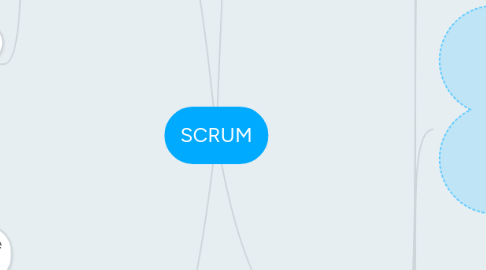
1. Artifacts
1.1. Independent Negotiable Valuable Estimable Small Testable
1.1.1. Specific Measurable Achievable Realistic Time-boxed
1.2. Product Backlog: anyone can add PBI (Product Backlog Items) - User Story or Use Case Scenario. PO sets Priority.
1.2.1. Item PBI1 priority 100
1.2.2. Item PBI2 priority 100
1.2.3. Item PBI3 priority 50
1.2.4. Item PBIn priority Pn
1.3. Sprint Backlog
1.3.1. Item SBI1 priority 100
1.3.1.1. Task 1
1.3.1.2. Task 2
1.3.1.3. Task N
1.3.2. Item SBI2 priority 50
1.3.2.1. Task 1
1.3.2.2. `Task 2
1.3.2.3. Task N
1.3.3. Item SBIm priority Pm
1.3.3.1. Task 1
1.3.3.2. `Task 2
1.3.3.3. Task N
2. Criteria
2.1. Defenition of Done (for all of PBIs)
2.1.1. Properly tested
2.1.2. Refactored
2.1.3. Potentially shippable
2.2. Acceptance Criteria
2.2.1. Must be set for every Story
2.3. No "Partly Done", nothing is Done until it hits DoD and AC. All the inprovement of Done PBI shold be added as new PBIs.
3. Epics: large story that cannot be completed in a single sprint. It is a Story, so it has a single Acceptance Criteria.
4. Theme: group of user stories that share a common attribute, and for convenience they are grouped together. It is a group of Stories with all their own attributes. Kinda Subproject.
5. Roles
5.1. Scrum Master
5.1.1. Not a Project Manager
5.1.2. Facilitator, kinda Delivery Manager whith some strict functions
5.2. Product Owner
5.2.1. ROI (Return On Investement)
5.2.2. Final Arbitier on Requirements
5.2.3. Focus on WHAT, not on HOW
5.3. Dev Team (4..9 persons)
5.3.1. Cross-functional
5.3.2. Make Shippable Product every iteration
5.3.3. Collaborative
5.3.4. Self-organizing
6. Meetings
6.1. Backlog Refinement Meeting (some days before Sprint's end).
6.1.1. Estimations of effort
6.1.2. Requirements clarification
6.1.3. Decomposition of large PBIs
6.2. Sprint Planning
6.2.1. Before we start. Commiting PBI to SBI. 4 hours.
6.3. Daily Scrums
6.3.1. Every morning. Discussing, what have we done yesterday, what are we going to do today, blokers, accents and so on. 15 mins. Allthe sidebar topics should be collected and discussed in other way and time.
6.4. Sprint Review
6.4.1. PSP demonstration. Acceptance criteria checks.
6.4.2. PO declares what's done or not (commited PBIs)
6.4.3. Measure velocity (optional) - the sum of Story Points in all the Done PBIs
6.4.4. Stakeholder feedback
6.4.5. Adding PBIs if needed
6.5. Sprint Retrospective Process <-> Product
6.5.1. Safety Check: every Team Member sets the status of comfort in SR meeting (anonimly).
6.5.2. Classic Scrum Retrospective
6.5.2.1. What went well, what did we learn (pluses)?
6.5.2.2. What could be improved, what sill puzzles us (deltas)?
6.5.2.3. Actions (set after pluses and deltas discussed)
6.5.3. Focused Conversation Principles: Decisions Come Last
6.5.3.1. (O)bjective questions - What happened?
6.5.3.2. (R)eflective questions - How do we feel about it?
6.5.3.2.1. (I)nterpretive questions - What does it mean?
6.5.3.3. (D)ecision questions - What should we do?
6.5.4. Silent Writting
6.5.4.1. Everyone writes a Post-It note of the finished Sprint, 10 mins
6.5.4.2. Stick the notes on a board. Maybe group. Discuss every note.
6.5.4.3. Write the Actions to impove discussed cases
6.5.5. Timeline Retrospective
6.5.5.1. Draw a line for the Sprint's time
6.5.5.2. Everyone recollects the events of the Sprint and sticks them on the timeline.
6.5.5.3. Read&Discuss
6.5.6. Decisions
6.5.6.1. After everything is discussed
6.5.6.2. No Scrum Master, Team only
6.6. Release Planning = Sprint 0
6.6.1. Definition of Done
